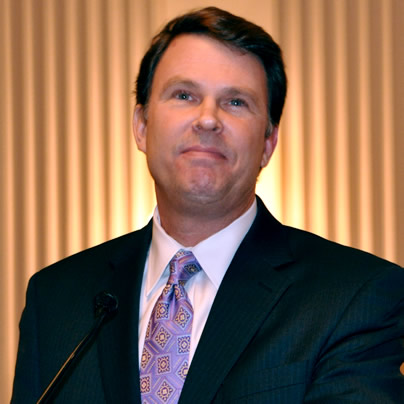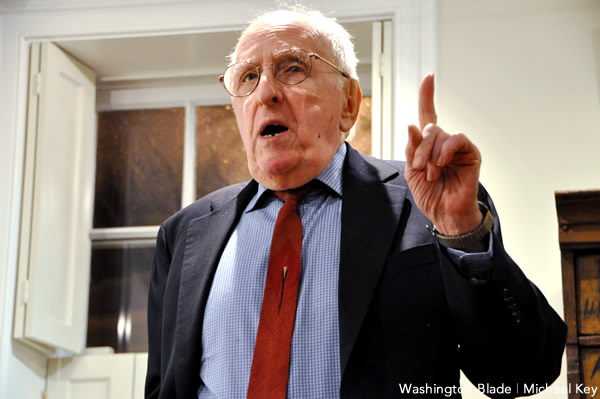Politics
Berry to exit this week as OPM director
Move comes after four years as highest-ranking out gay official in the administration

The official who’s considered the highest-ranking openly gay member of the Obama administration is set to leave his post as director of the Office of Personnel Management at the end of this week.
In an email to workers within the agency, Berry talks of his plans to leave his position at the end of his term after four years of service. The email was first reported by Federal News Radio.
“From my first day on the job through to today, I’ve known that I could count on this team to accomplish great things,” Berry wrote. “Together we undertook big challenges. We aimed to simplify and speed hiring, to boost hiring among Veterans and Americans with disabilities, to catch up and keep up with both retirement and background investigations, and to expand access to health insurance. We’ve done all that and more — much more.”
In the message, Berry says OPM General Counsel Elaine Kaplan, who’s also gay, will take over as acting director. Last month, President Obama nominated her for a seat on the U.S. Court of Federal Claims.
Berry took on the job on April 13, 2009, so his departure will be nearly four years to the day that he started the role. According to Federal News Radio, Berry informed the Chief Human Capital Officers Council earlier this month of his intention to leave. The news outlet also states the position of OPM director is limited to a four-year term, and although Obama can extend the term through re-nomination, there is no indication he will do so.
In a statement on Friday, President Obama praised Berry for his work at OPM, saying he’s “served the American people well” as head of the agency.
“He’s streamlined the way federal employees are hired, modernized the workplace, made the federal workforce more diverse, and increased the number of returning servicemembers hired by the government,” Obama said. “John has been a champion for federal workers – men and women who devote their lives to vital tasks like securing our borders, curing disease, and keeping the American people safe. This country is better off because of John’s talent and dedication, and I’m grateful to him for his service.”
Under Berry’s tenure at OPM, Obama issued a memorandum extending limited benefits to federal workers with same-sex partners. Additionally, OPM proposed a rule that would enable gay federal workers to cover the children of their same-sex partners under federal health insurance.
Berry has been active as an adviser on LGBT issues for the administration. The OPM director was present at the meeting in which White House officials informed LGBT advocates it won’t issue at this time an executive order barring LGBT workplace discrimination among federal contractors, and Berry also took part in a White House meeting with transgender advocates on the Transgender Day of Remembrance.
The Washington Post reported last month that Berry is in the running for the nomination as U.S. ambassador to Australia. His name has often been floated for other positions within the administration — such as secretary of the interior, which ultimately went to Washington State-based businessperson Sally Jewell. Had Berry been chosen, he would have been the first openly gay Cabinet member in the nation’s history.
It’s unclear who’ll be the highest-ranking openly LGBT person within the Obama administration upon Berry’s departure. That distinction may go to Fred Hochberg, who serves as head of the U.S. Export-Import Bank.
Berry’s complete farewell email to employees follows:
As many of you know, my term as Director of OPM will shortly come to a close. Starting April 15th, Elaine Kaplan will serve as Acting Director – and I know that each of you will be just as helpful to her as you’ve been for me.
From my first day on the job through to today, I’ve known that I could count on this team to accomplish great things.
Together we undertook big challenges. We aimed to simplify and speed hiring, to boost hiring among Veterans and Americans with disabilities, to catch up and keep up with both retirement and background investigations, and to expand access to health insurance
We’ve done all that and more – much more.
Today we handle over 2 million background investigations a year so smoothly that we’ve taken the issue off the GAO list.
We’ve eliminated KSA’s and moved to the world of the resume. We’ve given our applicants the respect of timely responses and concise job announcements. More than three-quarters of our job announcements were longer than 5 pages in 2009 –now 69% are shorter than 5 pages. We relaunched –and repaired – USAJOBS, and have now processed over 29 million applications since the update, with feedback that’s better than ever.
We’ve raised the bar in big ways on hiring Veterans – from 24% of new hires in 2009 to 28.3% in 2011, and even higher preliminary numbers in 2012, reaching all-time highs. Likewise, we’ve lifted hiring of Americans with disabilities to all-time highs, at 7.96% of all new hires. Including Veterans who are 30% or more disabled, people with disabilities now represent 14.7% of all new hires – also an all-time high.
We’ve revitalized our appeal for students and recent graduates, with three clear and streamlined pathways that will keep the best talent coming into public service. We’ve taken the lead in boosting diversity and inclusion, with comprehensive plans from every agency, and partnerships both in and out of government. We’ve expanded benefits for same-sex partners of Federal employees to the full extent allowed by law.
We’ve set the Senior Executive Service on a new path to fulfill old principles, with a strengthened merit system, new and better training programs, and an increasingly inclusive culture across agencies – bringing more women and minorities into the SES than ever in its history.
We’ve made Federal health insurance possible for firefighters and emergency response workers, and for over 10,000 tribal employees. On an overhead of less than 0.1% of premiums, we’ve kept premium increases for our 8 million FEHBP members well below the industry average – just 3.4% in each of the past two years. We stood up the Pre-existing Condition Insurance Program, and we’re on our way to certifying quality health insurance plans for the multi-state programs that open this fall.
We’ve systematically worked our way through the backlog in retirement applications, with partners and process changes that met even the challenge of extra retirements from Postal Service buyouts. We gained a new phased retirement authority that’s sure to help smooth transitions and transfer institutional memory through part-time work for aging employees and mentorships for those who take over the reins.
We launched the Feds Feeds Families drive, gathering almost 16 million pounds of food and non-perishables for needy families across the nation.
We brought labor and management together to agree on the GEAR framework for performance management.
We undertook the largest-ever employee viewpoint survey – and at the same time saw our agency climb up the standings to become one of the Federal Government’s best places to work. We’ve used employee wellness programs to quit smoking and lose weight.
We’ve brought our agency website forward at least a decade in both appearance and utility, and we’ve learned the ways of social media to help spread our messages far and wide. Through the CHCO Council and HRU, we’ve saved over $55 million on training, and we’ve proved to agencies that we’re here to help.
We’ve started the ball rolling on changes that will help the Combined Federal Campaign continue its success as the world’s biggest workplace charity drive by making sure that every last dime of employees’ donations go into the charities they’ve chosen.
We’ve weathered a storm or two – even an earthquake – and we’ve expanded telework to keep agencies achieving their missions, no matter what the weather.
We’ve brought great ideas in from the private sector in the form of our Innovation Lab, a place and an approach that is already generating new approaches and new savings.
Through it all, it’s been a tremendous honor to serve as your leader.
Your achievements are many and magnificent – and I deeply appreciate the work you’ve done to make it all possible.
Your grateful Director,
John Berry
UPDATE: This article has been updated to include a statement from President Obama.
Politics
Survey finds support for Biden among LGBTQ adults persists despite misgivings
Data for Progress previewed the results exclusively with the Blade

A new survey by Data for Progress found LGBTQ adults overwhelmingly favor President Joe Biden and Democrats over his 2024 rival former President Donald Trump and Republicans, but responses to other questions may signal potential headwinds for Biden’s reelection campaign.
The organization shared the findings of its poll, which included 873 respondents from across the country including an oversample of transgender adults, exclusively with the Washington Blade on Thursday.
Despite the clear margin of support for the president, with only 22 percent of respondents reporting that they have a very favorable or somewhat favorable opinion of Trump, answers were more mixed when it came to assessments of Biden’s performance over the past four years and his party’s record of protecting queer and trans Americans.
Forty-five percent of respondents said the Biden-Harris administration has performed better than they expected, while 47 percent said the administration’s record has been worse than they anticipated. A greater margin of trans adults in the survey — 52 vs. 37 percent — said their expectations were not met.
Seventy precent of all LGBTQ respondents and 81 percent of those who identify as trans said the Democratic Party should be doing more for queer and trans folks, while just 24 percent of all survey participants and 17 percent of trans participants agreed the party is already doing enough.
With respect to the issues respondents care about the most when deciding between the candidates on their ballots, LGBTQ issues were second only to the economy, eclipsing other considerations like abortion and threats to democracy.
These answers may reflect heightened fear and anxiety among LGBTQ adults as a consequence of the dramatic uptick over the past few years in rhetorical, legislative, and violent bias-motivated attacks against the community, especially targeting queer and trans folks.
The survey found that while LGBTQ adults are highly motivated to vote in November, there are signs of ennui. For example, enthusiasm was substantially lower among those aged 18 to 24 and 25 to 39 compared with adults 40 and older. And a plurality of younger LGBTQ respondents said they believe that neither of the country’s two major political parties care about them.
Politics
Court records raise concerns about right-wing TikTok investor’s influence
Jeff Yass is a Pa. billionaire who has funded anti-LGBTQ causes

The role played by Pennsylvania billionaire Jeff Yass in the creation of TikTok might be far greater than was previously understood, according to new reporting that raises questions about the extent of the right-wing megadonor’s influence over matters at the intersection of social media, federal regulations, and electoral politics.
In 2012, Yass’s firm, Susquehanna International Group, spent $5 million for 15 percent of the short-form video hosting platform’s Chinese-owned parent, ByteDance. In the years since, as TikTok grew from a nascent startup to a tech giant with 1.5 billion active monthly users and an estimated $225 billion valuation, Yass and his firm pocketed tens of billions of dollars.
Beyond the size of Susquehanna’s ownership stake, little was known about its relationship with ByteDance until documents from a lawsuit filed against the firm by its former contractors were accidentally unsealed last month, leading to new reporting by the New York Times on Thursday that shows Susquehanna was hardly a passive investor.
In 2009 the firm used a proprietary, sophisticated search algorithm to build a home-buying site called 99Fang, tapping software engineer and entrepreneur Zhang Yiming to serve as its CEO. The company folded. And then, per the Times’s review of the court records, in 2012 Susquehanna picked Yiming to be the founder of its new startup ByteDance and repurposed the technology from 99Fang for use in the new venture.
Importantly, the documents do not provide insight into Yass’s personal involvement in the formation of ByteDance. And Susquehanna denies that the company’s search algorithm technologies were carried over from the real estate venture — which, if true, would presumably undermine the basis for the lawsuit brought by the firm’s former contractors who are seeking compensation for the tech used by ByteDance.
Questions about Yass’s influence come at a pivotal political moment
In recent weeks, federal lawmakers have moved forward with a proposal that would force ByteDance to divest TikTok or ban the platform’s use in the U.S. altogether, citing the potential threats to U.S. national security interests stemming from the company’s Chinese ownership.
The bill was passed on March 13 with wide bipartisan margins in the House but faced an uncertain future in the Senate. However, on Wednesday, House Speaker Mike Johnson (R-La.) announced plans to fold the proposal into a measure that includes foreign aid to Ukraine, Israel, and Taiwan, likely bolstering its chances of passage by both chambers.
Last month, shortly after meeting with Yass at his home in Mar-a-Lago, former President Donald Trump changed his longtime stance and came out against Congress’s effort to break up or ban TikTok. The timing led to speculation about whether the billionaire businessman was behind Trump’s change of heart, perhaps by contributing to the cash-strapped Republican presidential nominee’s electoral campaign or through other means.
Meanwhile, Yass has emerged as the largest donor of the 2024 election cycle. A coalition of public interest and government watchdog groups have called attention to the vast network of right-wing political causes and candidates supported by the billionaire, often via contributions funneled through dark money PACs that are designed to conceal or obscure the identities of their donors.
The Action Center on Race and the Economy, Make the Road, POWER Metro: Faith in Action, Free the Ballot, and Little Sis launched a website called All Eyes on Yass that features research into the various causes he supports, along with insight into the networks connecting the entities funded by his contributions.
Broadly, in Pennsylvania they fall into five categories: Advocacy against reproductive freedom and LGBTQ rights via the Pennsylvania Family Institute, lobbying on behalf of oil and gas industry interests by the Pennsylvania Manufacturers’ Association, anti-union groups supported by Commonwealth Partners, a privately owned registered investment advisory firm/independent broker-dealer, the Commonwealth Foundation for Public Policy Alternatives, which seeks to privatize public schools and defeat proposed increases to the minimum wage, and the Citizens Alliance of Pennsylvania, which advocates for lowering taxes on corporations and the rich.
Additionally, All Eyes on Yass reports that the billionaire has given massive contributions to Club for Growth and direct spending to support the electoral campaigns of right-wing Republicans including Florida Gov. Ron DeSantis; U.S. Sens. Ted Cruz (Texas), Rand Paul (Ky.), and Josh Hawley (MO); U.S. Rep. Lauren Boebert (Colo.), and former U.S. Rep. Madison Cawthorn (N.C.).
Congress
Lawmakers champion drug policy reforms at National Cannabis Policy Summit
Congressional leaders pledged their support for decriminalization

Speaking at the 2024 National Cannabis Policy Summit on Wednesday, congressional leaders pledged their support for proposals to remedy the harms of America’s War on Drugs while protecting cannabis users and cannabis businesses that are operating under a fast-evolving patchwork of local, state, and federal laws.
Overwhelmingly, the lawmakers who attended the conference at the Martin Luther King Jr. Memorial Library in D.C. or delivered their remarks virtually were optimistic about the chances of passing legislative solutions in the near-term, perhaps even in this Congress.
Participants included U.S. Sens. Raphael Warnock (D-Ga.), Jeff Merkley (D-Ore.), Elizabeth Warren (D-Mass.), and Senate Majority Leader Chuck Schumer (D-N.Y.), along with U.S. Reps. Eleanor Holmes Norton (D-D.C.), Earl Blumenauer (D-Ore.), and Barbara Lee (D-Calif.), who co-chairs the Congressional Cannabis Caucus and was honored at the event with the Supernova Women Cannabis Champion Lifetime Achievement Award. Republicans included an aide for U.S. Rep. David Joyce (R-Ohio) who was featured in an afternoon panel discussion about the cannabis policy landscape on Capitol Hill.
Each of the members have long championed cannabis-related policy reforms, from Merkley’s SAFER Banking Act that would allow cannabis businesses to access financial services (thereby affording them the critically important protections provided by banks) to Lee’s work throughout her career to ameliorate the harms suffered by, particularly, Black and Brown communities that have been disproportionately impacted by the criminalization of marijuana and the consequences of systemic racism in law enforcement and the criminal justice system.
The lawmakers agreed America is now at an inflection point. Democratic and Republican leaders are coming together to support major drug policy reforms around cannabis, they said. And now that 40 states and D.C. have legalized the drug for recreational or medical use, or both, the congress members stressed that the time is now for action at the federal level.
Last summer, the U.S. Department of Health and Human Services issued a formal request to re-categorize marijuana as a Schedule III substance under the rules and regulations of the Controlled Substances Act, which kicked off an ongoing review by the Biden-Harris administration. Since the law’s enactment in 1971, cannabis has been listed as a Schedule I substance and, therefore, has been subject to the most stringent restrictions on and criminal penalties for its cultivation, possession, sale, and distribution.
Merkley acknowledged that re-scheduling would remedy the Nixon administration’s “bizarre” decision to house marijuana under the same scheduling designation as far more harmful and addictive drugs like heroin — and noted that the move would also effectively legalize biomedical research involving cannabis. However, the senator said, while re-scheduling “may be a step in the right direction, it’s not de-scheduling” and therefore would not make real inroads toward redressing the harms wrought by decades of criminalization.
Likewise, as she accepted her award, Lee specified that she and her colleagues are “working night and day on the legalization, not re-scheduling.” And her comments were echoed by Warren, who proclaimed in a prerecorded video address that “de-scheduling and legalizing cannabis is an issue of justice.”
Congressional Republicans have blocked legislation to legalize marijuana, the Massachusetts senator said, “and that is why the scheduling is so important,” as it might constitute a “tool that we can use to get this done without Republican obstruction.”
Warren, Merkley, and Schumer were among the 12 Senate Democrats who issued a letter in January to the U.S. Drug Enforcement Administration requesting transparency into its re-scheduling process while also, more importantly, demanding that the agency fully de-schedule cannabis, which would mean the drug is no longer covered by the Controlled Substances Act.
However, in a possible signal of political headwinds against these efforts, their Republican colleagues led by U.S. Sen. Mitt Romney (R-Utah) responded with a letter to DEA Administrator Anne Milgram “highlighting concerns over HHS’s recommendation to reschedule marijuana from a Schedule I to Schedule III-controlled substance.” The GOP signatories, all of whom serve on the Senate Foreign Relations Committee, also sought to “underscore the Drug Enforcement Administration’s (DEA) duty under the Controlled Substances Act (CSA) to ensure compliance with the United States’ treaty obligations under the Single Convention on Narcotic Drugs.”
As Norton noted during her prepared remarks, elected Democrats are not necessarily always on the same page with respect to expanding access to economic opportunity facilitated by cannabis. For instance, though President Joe Biden had promised, during his State of the Union address this year, to direct his “Cabinet to review the federal classification of marijuana, and [expunge] thousands of convictions for mere possession,” Norton blamed Biden along with House Republicans for provisions in the federal budget this year that prohibit D.C. from using local tax dollars to legalize cannabis sales.
A non-voting delegate who represents the city’s 690,000 residents in the House, Norton called the president’s position “deeply disappointing,” particularly considering his record of supporting “D.C. statehood, which would allow D.C. to enact its own policies without congressional interference” and grant its residents voting representation in both chambers of Congress. She added that the majority of Washingtonians are Black and Brown while all are held responsible for “the obligations of citizenship including paying federal taxes.”
Norton said the city should also have the power to grant clemency for crimes committed in the District, including cannabis-related crimes — power that, currently, can only be exercised by the president.
Some Republican lawmakers have been at the forefront of efforts to reform harmful cannabis regulations. For instance, a participant in a mid-afternoon panel pointed to the CURE Act, a bill introduced by U.S. Reps. Nancy Mace (R-S.C.) and Jamie Raskin (D-Md.) that would prohibit the federal government from denying security clearances based on applicants’ past or current use of cannabis.
While securing statehood for D.C. and de-scheduling cannabis via legislation or administrative action are perhaps, at least for now, a heavy lift, Merkley pointed to promising new developments concerning his SAFER Banking Act.
The Oregon senator first introduced the measure, then titled the SAFE Banking Act, in 2019, and he said the legislation’s evolution into its current iteration was difficult. “Regulators don’t want to be told what to do,” Merkley said, and negotiations with these officials involved “nitty-gritty arguments over every word.”
Pushback also came from one of Merkley’s Democratic colleagues. In September, Warnock, who is Georgia’s first Black U.S. senator, voted “no” on the 2023 version of the SAFER Banking Act, writing: “My fear is that if we pass this legislation, if we greenlight this new industry and the fees and the profits to be made off of it without helping those communities” most harmed by the War on Drugs “we will just make the comfortable more comfortable.”
Warnock’s statement followed his pointed remarks expressing concerns with the legislation during a Senate Banking Committee hearing.
“Let me be very clear,” he said, “I am not opposed to easing or undoing federal restrictions around cannabis. And I would support all of the provisions and reforms in this legislation if paired with broader cannabis reforms that substantively address the issue of restorative justice. This bill does not do that.”
At this point, however, the latest version of the SAFER Banking Act has advanced out of committee and earned the support of Senate leaders including Schumer and much of the Republican conference.
“This is the moment,” he said. “Let’s not let this year pass without getting this bill — the safer banking bill — through the House, through the Senate, and on the president’s desk.”
In her remarks, Lee also discussed the importance of business and industry-wide reforms like those in Merkley’s bill.
“We have to make sure that the cannabis industry is viewed by everyone, especially our federal government, as a legitimate business,” Lee said. “Legitimate, which deserves every single aspect of financial services that any legitimate business deserves and has access to.”
Like Warnock, the congresswoman also highlighted how these financial and business considerations intersect with “equity issues,” as “those who have been most impacted by this horrible War on Drugs” must “become first in line for the businesses and for the jobs and for the economic opportunity the cannabis industry provides.”
Reflecting on her experience introducing the Marijuana Justice Act in 2019, which was Congress’s first racial justice cannabis reform bill, Lee remembered how “everyone was like, ‘why are you doing this? It’s politically not cool.’” Her legislation sought to end the federal criminalization of marijuana, expunge the criminal records of those convicted of cannabis-related crimes, and reinvest in communities that have suffered disproportionately from the War on Drugs.
The congresswoman said she explained to colleagues how the bill addressed “many, many layers” of often-intersecting problems linked to federal cannabis policy, telling them: “This is a criminal justice issue, a racial justice issue, an issue of equity, a medical issue, a veterans’ issue, and an issue of economic security.”
Two years later, with a 220-204 vote, the House successfully passed the Marijuana Opportunity Reinvestment and Expungement Act, a comprehensive bill introduced by U.S. Rep. Jerry Nadler (D-N.Y.) and to the Senate by then-U.S. Sen. Kamala Harris (D-Calif.). The measure included Lee’s Marijuana Justice Act.
“This bill is the product of many, many years of advocacy for federal cannabis reform and equity,” she said in a statement celebrating the bill’s passage. “Make no mistake: This is a racial justice bill. It’s about the thousands of people of color who sit in jail for marijuana offenses while others profit. It’s about finally repairing the harms of the War on Drugs on communities and families across the country.”
“We’ve come a long way,” she told the audience on Wednesday. “And now we have a long way to go.”
-

 Africa5 days ago
Africa5 days agoCongolese lawmaker introduces anti-homosexuality bill
-

 District of Columbia2 days ago
District of Columbia2 days agoReenactment of first gay rights picket at White House draws interest of tourists
-

 World5 days ago
World5 days agoOut in the World: LGBTQ news from Europe and Asia
-

 District of Columbia1 day ago
District of Columbia1 day agoNew D.C. LGBTQ+ bar Crush set to open April 19










